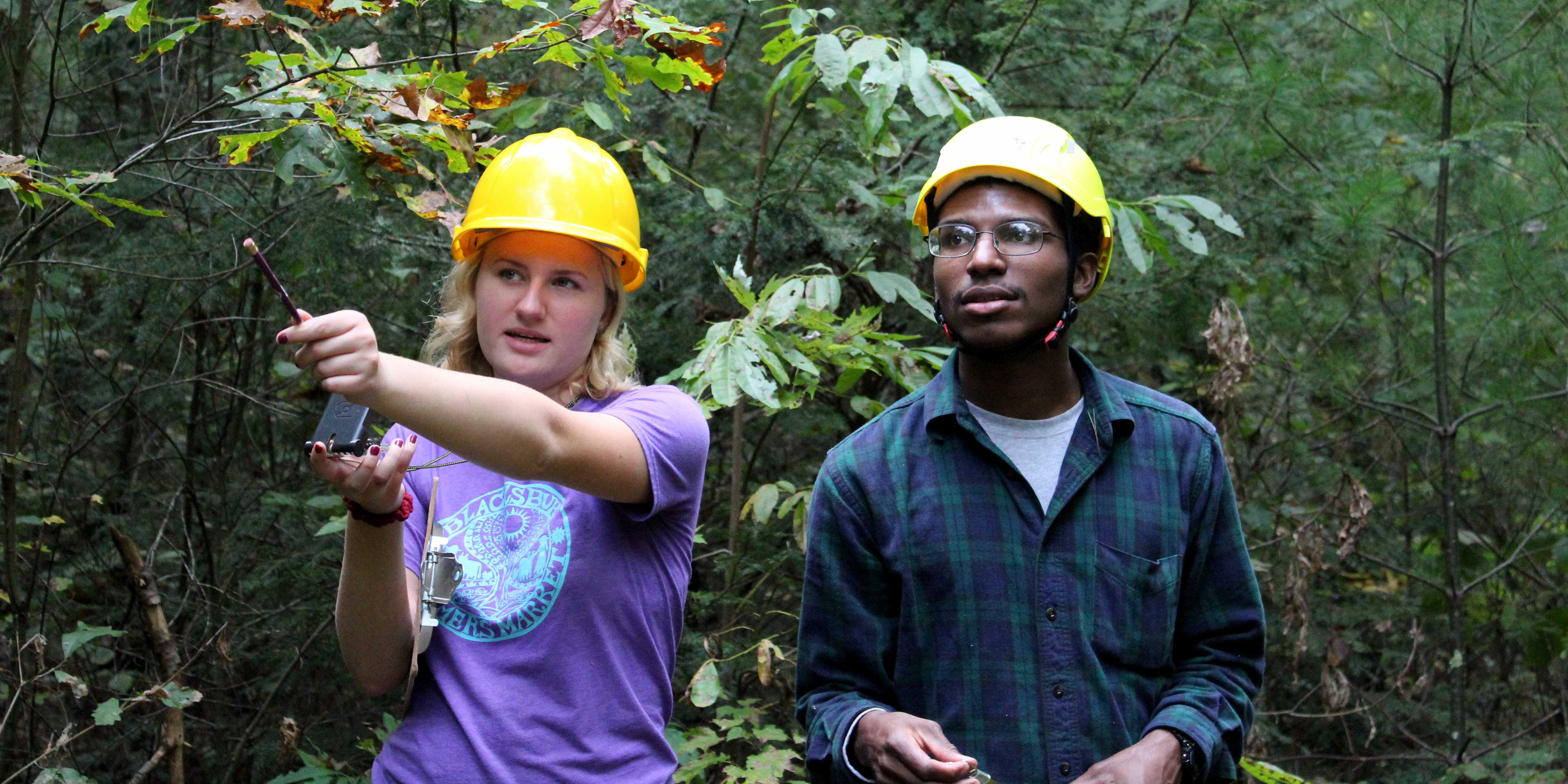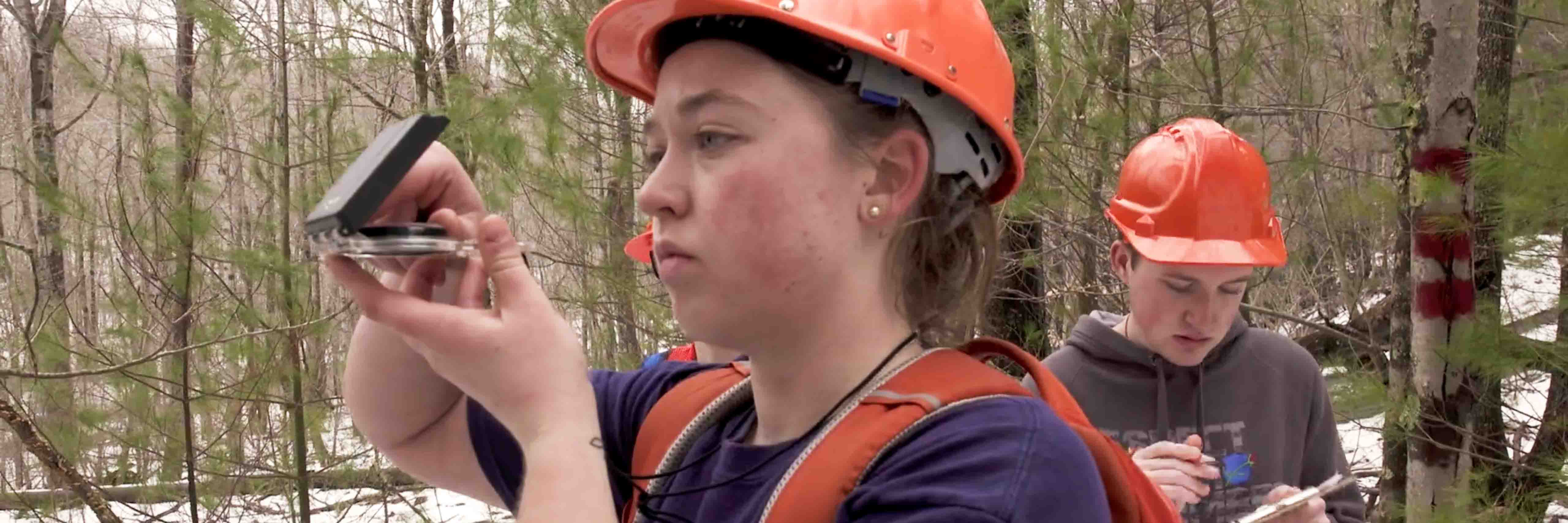Forestry
Discover your path in the forestry major
03:23
What is forestry?
Students majoring in forestry are working to ensure sustainable access to one of society’s most vital natural resources: wildland and urban forests. This major addresses both the scientific and human elements of forest ecosystem management, and you’ll learn about the life cycle and management of hundreds of tree species. You’ll graduate with a sense of stewardship and land-use ethics, and be prepared to take an active role in finding new and better ways to conserve, use, and sustain the world’s vital forest resources.
Learn more about this major and the Department of Forest Resources and Environmental Conservation.
What will I learn in this major?
Students majoring in forestry take courses in the following core areas: forest science, geospatial analysis, environmental economics, and natural resources policy. Students also take courses based on their specific option in one of the following areas:
- Forest operations and business — Fire ecology and management, forest biometrics, soil management, forest harvesting, timber procurement, forest management, accounting, business writing, and business law and ethics.
- Forest resources management — Fire ecology and management, forest biometrics, forestry field skills, outdoor recreation management, forest harvesting, forest boundaries, soil management, forests and pest management, accounting, chemistry, and physical science.
- Urban and community forestry — Community forest management, forest and tree pests, geospatial analysis, soil science, arboriculture, landscape architecture, urban affairs and planning, and woody landscape plants.

Why study forestry at Virginia Tech?
- All students in the major enroll in Field Experience in Forest Resources and Environmental Conservation, a hands-on field course that helps students develop key skills in navigation, mapping, taking inventory, resource conservation and management, timber harvesting, and forestry operations.
- You can take part in an undergraduate research project such as studying wildfire hazards and risks in the Great Smoky Mountains or conducting an ecological assessment on a forested section of the Virginia Tech campus.
- Internships are highly recommended and encouraged. Watch our internship videos and learn more as students talk about their experiences at the Harvard Forest, Virginia Department of Forestry, and other sites.
- You’ll learn from faculty like Carolyn Copenheaver, who is leading the charge to address sexual misconduct in field courses, and John Seiler (Dr. Dendro), who is known nationally for his annual fall foliage forecasts. Passing his Forest Biology and Dendrology lab class is akin to a badge of honor in the college.
- Students and faculty can take part in teaching and research activities in areas like the old-growth Stadium Woods and the 1,353-acre Fishburn Forest, which is located only 20 minutes from campus.
- In the senior capstone course, you’ll gain the invaluable experience of working with real-life “clients,” like landowner and Virginia Tech Athletic Director Whit Babcock, to synthesize four years of learning into a professional forest management plan.
- You might be interested in a CNRE or integrated Pathways minor that will provide you with additional subject matter expertise, allow you to pursue a passion, and help you stand out in the job market.
- Student organizations such as the Forestry Club and Society of American Foresters Student Chapter provide opportunities to make connections and get involved on campus and in the community. Virginia Tech also hosts Timberbeast, an annual timber sports and technical skills competition.
Field Experiences in Forest Resources and Environmental Conservation
01:21
What can I do with a degree in forestry?
Graduates in forestry may enter the job market or pursue a graduate degree in the field. Career possibilities are listed below, and potential employers include timber/lumber companies, forest products companies, U.S. Forest Service, National Park Service, state and local parks, environmental consulting firms, municipal forestry organizations, commercial tree care services, regional urban forest management groups, and nonprofit conservation organizations.
- Arborist — Employed by private firms, nonprofit organizations, and utility service providers to plant, maintain, and protect landscape trees in and around cities and neighborhoods.
- Consulting forester — Provides services and advice to companies, agencies, and individuals on how to manage forests for various uses.
- Extension agent — Provides the public with information gained from current research programs and speaks with community groups to teach them about forestry.
- Forest biologist — Protects the health of forests.
- Forest entomologist — Studies forest insects and their impacts on forest health.
- Forest manager — Manages forests to provide society with a renewable supply of wood and paper products, clean water, recreation opportunities, wildlife habitat, and environmental quality.
- Forest technician — Helps to manage forested areas on public lands: marks trees for cutting, measures and calculates timber volumes, and surveys and identifies areas to be harvested or improved.
- Geographic information system (GIS) programmer/computer mapping specialist — Uses computer technology to assist in managing forests and other natural resources.
- Government forester — Works with landowners to manage their forests or manages publicly owned forests.
- Landowner assistance forester — Provides technical assistance to landowners in managing forests for timber, wildlife, recreation, aesthetic quality, water quality, etc.
- Natural resources planning and policy advisor — Advises governments and other agencies that make regulations on the use and management of natural resources, and analyzes impacts of proposed regulations and policies.
- Procurement forester — Buys timber for paper and forest products companies.
- Urban forester — Employed by local government or state agencies to manage trees in public urban spaces and advise communities on how to care for their trees.
- Wildland firefighter — Uses a variety of tactics to suppress wildfires.

Attend a CNRE interest session
as part of your campus visit

Apply for admission
if CNRE is your place

Ask questions and connect
with our recruiter, John Gray Williams




